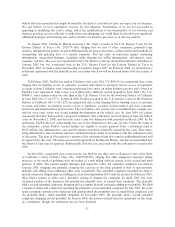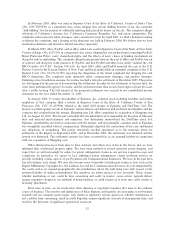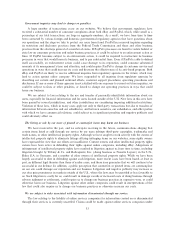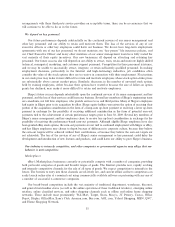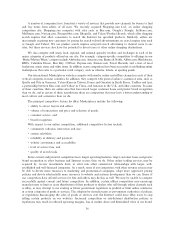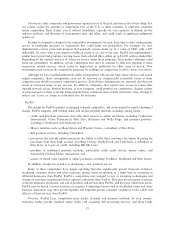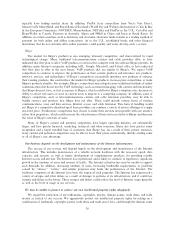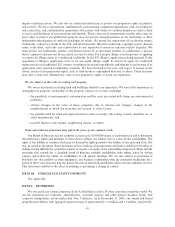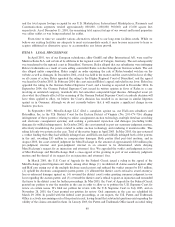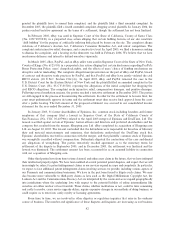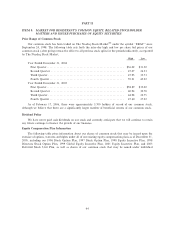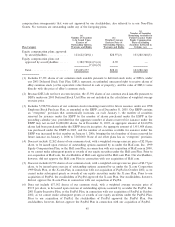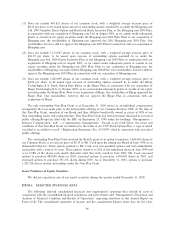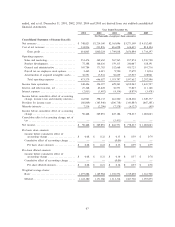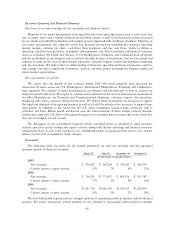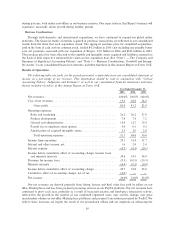eBay 2005 Annual Report Download - page 44
Download and view the complete annual report
Please find page 44 of the 2005 eBay annual report below. You can navigate through the pages in the report by either clicking on the pages listed below, or by using the keyword search tool below to find specific information within the annual report.and the total square footage occupied by our U.S. Marketplaces, International Marketplaces, Payments and
Communications segments totaled approximately 800,000, 1,000,000, 900,000, and 15,000 square feet
respectively. As of December 31, 2005, the remaining total square footage of our owned and leased properties
was either sublet or was being marketed for sublet.
From time to time we consider various alternatives related to our long-term facilities needs. While we
believe our existing facilities are adequate to meet our immediate needs, it may become necessary to lease or
acquire additional or alternative space to accommodate any future growth.
ITEM 3: LEGAL PROCEEDINGS
In April 2001, two of our European subsidiaries, eBay GmbH and eBay International AG, were sued by
Montres Rolex S.A. and certain of its affiliates in the regional court of Cologne, Germany. The suit subsequently
was transferred to the regional court in Dusseldorf, Germany. Rolex alleged that our subsidiaries were infringing
Rolex's trademarks as a result of users selling counterfeit Rolex watches through our German website. The suit
also alleged unfair competition. Rolex sought an order enjoining the sale of Rolex-branded watches on the
website as well as damages. In December 2002, a trial was held in the matter and the court ruled in favor of eBay
on all causes of action. Rolex appealed the ruling to the Higher Regional Court of Dusseldorf, and the appeal
was heard in October 2003. In February 2004, the court rejected Rolex's appeal and ruled in our favor. Rolex has
appealed the ruling to the German Federal Supreme Court, and a hearing is expected in December 2006. In
September 2004, the German Federal Supreme Court issued its written opinion in favor of Rolex in a case
involving an unrelated company, ricardo.de AG, but somewhat comparable legal theories. Although it is not yet
clear what the ultimate effect of the reasoning of the German Federal Supreme Court's ricardo.de decision will
have when applied to eBay, we believe the Court's decision has resulted in an increase in similar litigation
against us in Germany, although we do not currently believe that it will require a significant change in our
business practices.
In September 2001, MercExchange LLC filed a complaint against us, our Half.com subsidiary and
ReturnBuy, Inc. in the U.S. District Court for the Eastern District of Virginia (No. 2:01-CV-736) alleging
infringement of three patents (relating to online consignment auction technology, multiple database searching
and electronic consignment systems) and seeking a permanent injunction and damages (including treble
damages for willful infringement). In October 2002, the court granted in part our summary judgment motion,
effectively invalidating the patent related to online auction technology and rendering it unenforceable. This
ruling left only two patents in the case. Trial of the matter began in April 2003. In May 2003, the jury returned
a verdict finding that eBay had willfully infringed one and Half.com had willfully infringed both of the patents
in the suit, awarding $35 million in compensatory damages. Both parties filed post-trial motions, and in
August 2003, the court entered judgment for MercExchange in the amount of approximately $30 million plus
pre-judgment interest and post-judgment interest in an amount to be determined, while denying
MercExchange's request for an injunction and attorneys' fees. We appealed the verdict and judgment in favor
of MercExchange and MercExchange filed a cross-appeal of the granting in part of our summary judgment
motion and the denial of its request for an injunction and attorneys' fees.
In March 2005, the U.S. Court of Appeals for the Federal Circuit issued a ruling in the appeal of the
MercExchange patent litigation suit which, among other things (1) invalidated all claims asserted against eBay
and Half.com arising out of the multiple database search patent and reduced the verdict amount by $4.5 million;
(2) upheld the electronic consignment system patent; (3) affirmed the district court's refusal to award attorneys'
fees or enhanced damages against us; (4) reversed the district court's order granting summary judgment in our
favor regarding the auction patent; and (5) reversed the district court's refusal to grant an injunction and remanded
that issue to the district court for further proceedings. In May 2005, the Court of Appeals for the Federal Circuit
granted our petition to stay the mandate in the case in order to allow us to petition the U.S. Supreme Court for
review on certain issues. We filed our petition for review with the U.S. Supreme Court in July 2005, and on
November 28, 2005, the Court granted our petition for review. Oral arguments in the case are scheduled for
March 29, 2006. In parallel with the federal court proceedings, at our request, the U.S. Patent and Trademark
Office is actively reexamining each of the patents in suit, having found that substantial questions exist regarding the
validity of the claims contained in them. In January 2005, the Patent and Trademark Office issued an initial ruling
40



